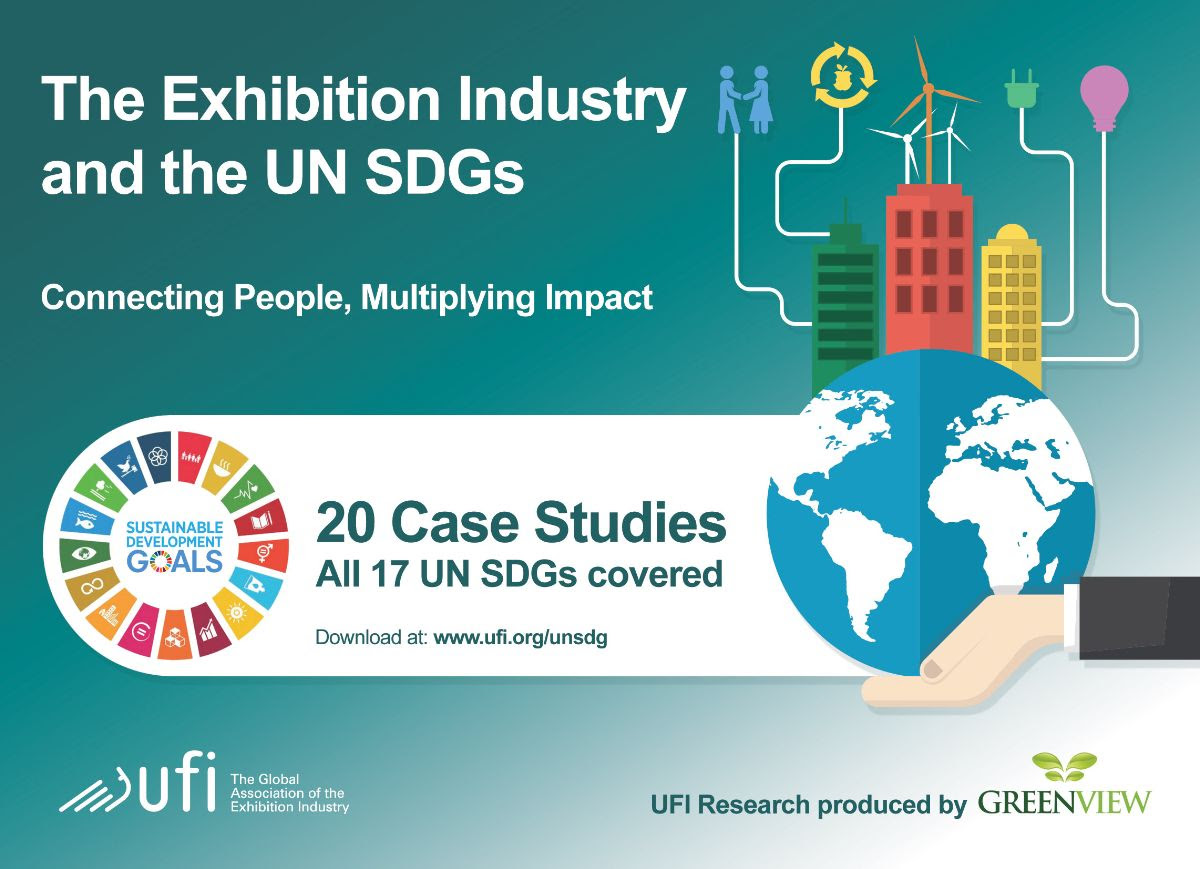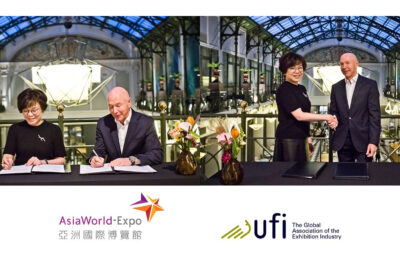UFI initiates SDG database for the exhibition industry. Submissions received from around the world, including from the three largest global exhibition organisers – Informa, Reed Exhibitions and Messe Frankfurt.
PARIS – On the occasion of this year’s Global Exhibitions Day (GED), UFI – the Global Association of the Exhibition Industry – is launching a new report and online database. It will track initiatives and projects in the exhibitions business globally that pay into the Sustainable Development Goals of the United Nations. This resource – a first of its kind – aims to showcase work done by organisers, venues, and service providers alike, and to inspire others to also launch projects under this United Nations framework scheme. It was initiated by UFI working group on Sustainability and put together in collaboration with Greenview, Member of this working group.
“As the exhibition industry, we are connecting markets to foster trade and development. Through our daily work, we help to drive the growth of economies and societies. With this new, publicly available online database, we want to grow the awareness of the United Nations’ Sustainable Development Goals and how exhibition industry players are contributing to catalyse a sustainable future for all,” says UFI President Craig Newman.
The database, launched officially on this year’s GED, can be accessed here. A summary report “The Exhibition Industry and the UN SDGs: Connecting People, Multiplying Impact” has also been produced.
In the first collection phase running up to early May 2019, a total of 20 exemplary submissions were accepted. The second collection phase will start from 6 June 2019. There are three entry types:
- Type I: Exhibition Theme: How the theme of the exhibition contributes to the SDGs
- Type II: Exhibition Operation: How the operator of the exhibition contributes to the SDGs
- Type III: Company’s Operations: How a company’s own operations contribute to the SDGs
The initial series of submissions gathered reveal that the SDG approach is well established within the exhibition industry’s leadership. Each submission demonstrated how their actions contribute to SDGs, how their actions were made possible, and quantify monetary, time and other impacts made. The in-depth sharing also included a section on feedback and lessons learned, which allows others who are interested in hosting a similar activity to learn from these valuable experiences.
Best practices and innovative ideas across these submissions were compiled into a summary report “The Exhibition Industry and the UN SDGs: Connecting People, Multiplying Impact”, which can be downloaded at ufi.org/unsdg 70% of submissions cited a contribution to SDG 12 on Responsible Consumption and Production. Actions taken include purchasing from local suppliers where possible, reducing usage of single-use plastic, reducing food wastage through composting or redistribution. Partnerships with suppliers, guests and local charities among others were often mentioned as key to achieving goals (SDG 17). We also see that sustainability is moving away from just being good-to-have to being part of the business model, with venue operators stipulating environmental terms in contracts.
Through multi-stakeholder partnerships, an impactful but high-cost project could be made viable. An example would be the Melbourne Convention and Exhibition Centre’s (MCEC) Melbourne Renewable Energy Project, where the wind farm’s high capital outlay was spread across the numerous partners, making possible the project that is set to benefit the city’s 4.4 million population. The project contributes to multiple SDGs – SDG 7 on Affordable and Clean Energy, SDG 8 on Decent Work and Economic Growth, SDG 9 on Industry, Innovation and Infrastructure, SDG 11 on Sustainable Cities and Communities, SDG 13 on Climate Action, and SDG 17 on Partnerships for the Goals.
The second most commonly cited SDG was SDG 8 on Decent Work and Economic Growth. This is not surprising as exhibitions reach out to tens of thousands of people and encompass all sectors of business, government, and civil society, with a large value chain of partners and stakeholders. The first series of submissions have showed us how the exhibition industry can touch SDGs in many different ways and can have a meaningful collective impact. We are encouraged to see the possibilities and hope to catalyse further action. As such, we are opening up a second phase of best practice collection.
Vicky is the co-founder of TravelDailyNews Media Network where she is the Editor-in Chief. She is also responsible for the daily operation and the financial policy. She holds a Bachelor's degree in Tourism Business Administration from the Technical University of Athens and a Master in Business Administration (MBA) from the University of Wales.
She has many years of both academic and industrial experience within the travel industry. She has written/edited numerous articles in various tourism magazines.
































































































































































































